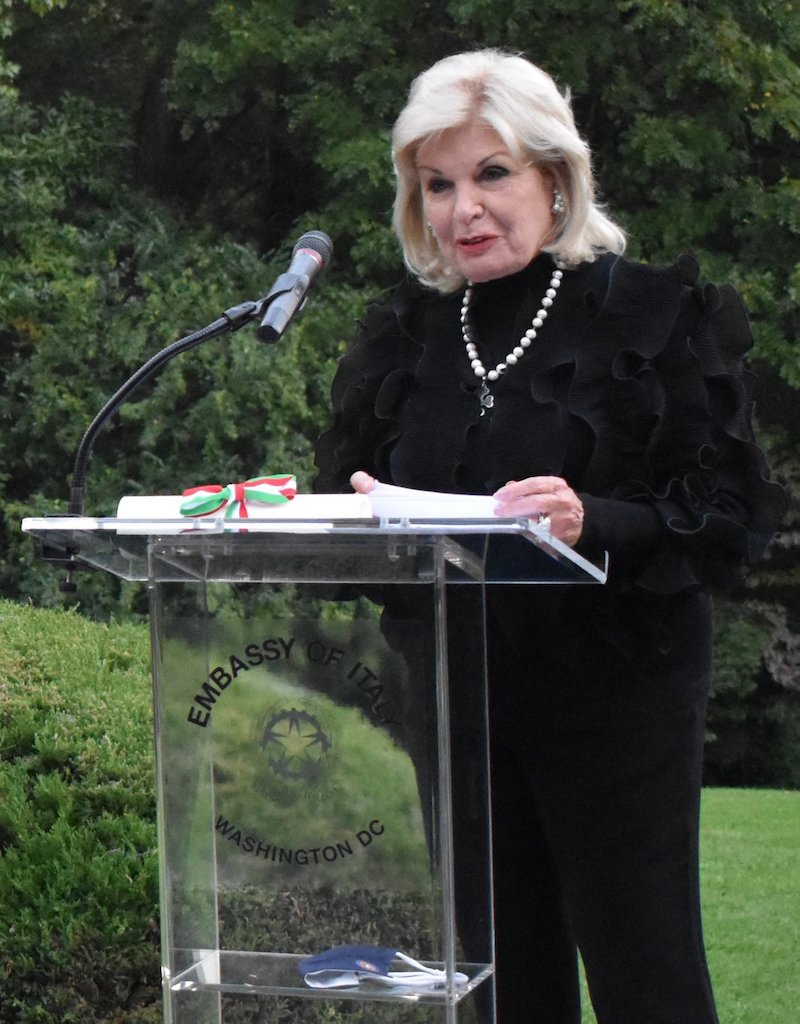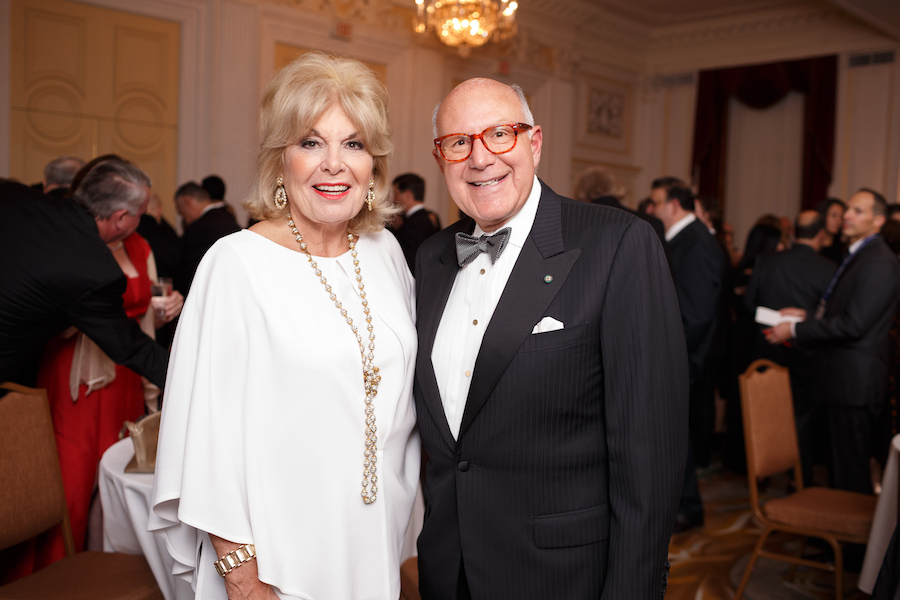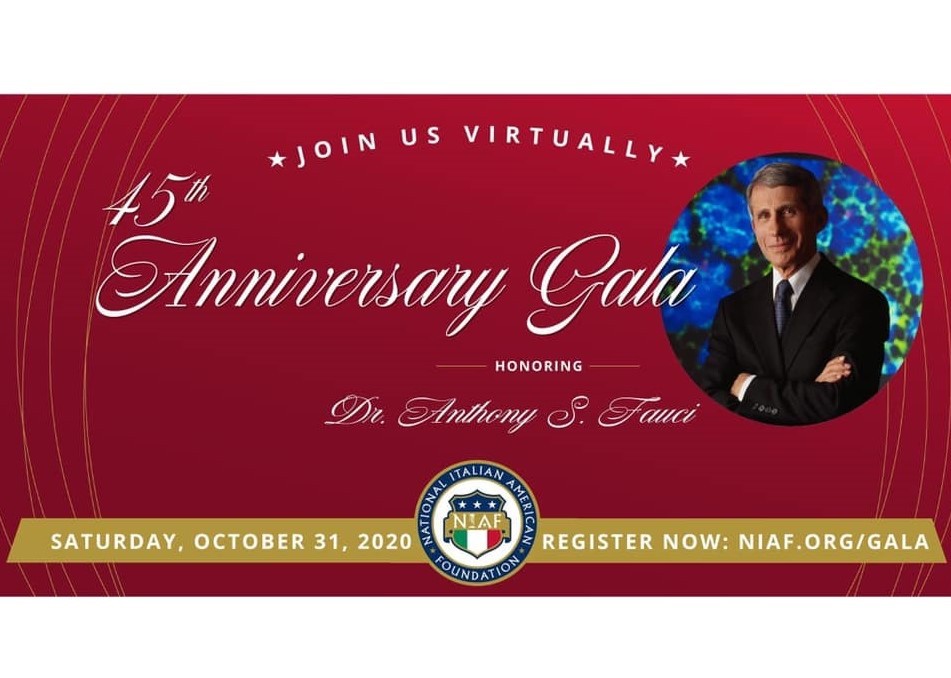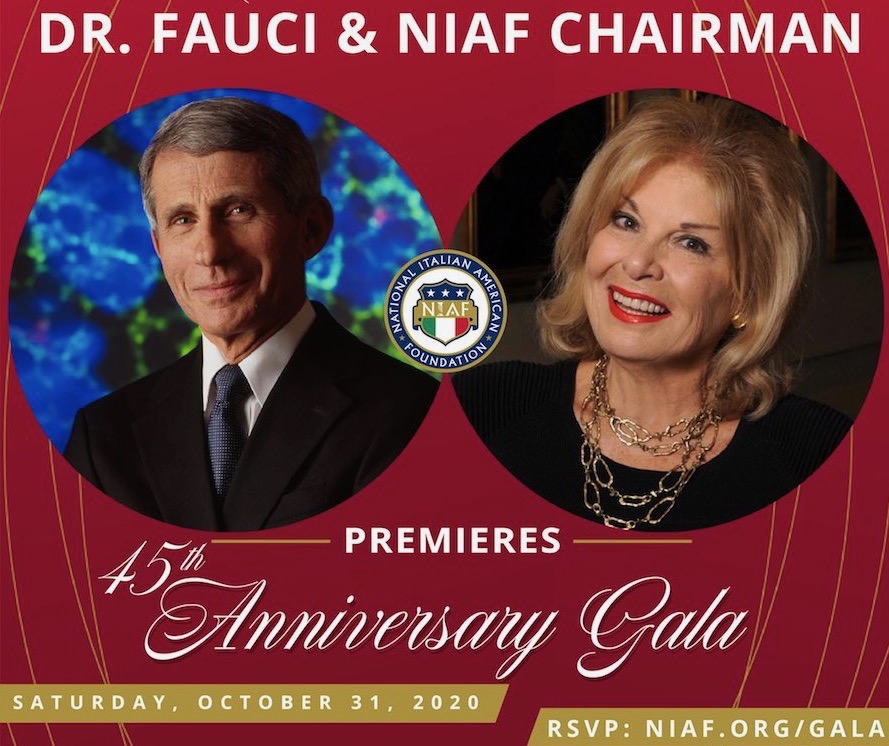A Conversation with NIAF Chairman Patricia Harrison

The National Italian American Foundation (NIAF) will celebrate its 45th Anniversary Gala virtually on Saturday, October 31, 2020, and honor Dr. Anthony S. Fauci, Director of the National Institute of Allergy and Infectious Diseases, who will be presented with NIAF’s 2020 Leonardo da Vinci Award for Leadership in Health and Science live during the Gala.
Since 1984, Dr. Fauci has advised six presidents on domestic and global health issues. He has been at the forefront of U.S. efforts to meet the challenge of viral diseases such as HIV, SARS, the 2009 swine flu pandemic, MERS, Ebola, and COVID-19.
Throughout this NIAF Gala evening, special appearances from “friends of Dr. Fauci” will include: Francis Ford Coppola, Tony Bennett, Alan Alda, Michael Douglas, Patti LuPone, Joe Mantegna, Isabella Rossellini, Paul Sorvino, John Turturro, Mario Andretti, Mike Piazza, Franco Harris, Leon Panetta and other surprise guests who will provide their personal tributes to Dr. Fauci and appreciation for his service to the nation.

The Georgetown Dish had a chance to sit down with NIAF Chairman Patricia de Stacy Harrison, president and CEO of the Corporation for Public Broadcasting to learn more about her Italian heritage, empowerment and NIAF.
DISH: Along with Anita Bevacqua McBride, you recently were awarded the Italian honor of “Cavaliere” of the Order of Merit of the Italian Republic, the highest-ranking honor of the Italian Republic. While you’ve received many awards for your public service, this one, equivalent to British knighthood, must have been quite special.
Harrison: It is hard to articulate how much this specific honor means to me, my family, and my extended NIAF family. I grew up in Brooklyn, New York. Every Sunday we would get in the car and drive for about 15 minutes to my nonna and nonno’s house for after church lunch that turned into dinner. My aunts and uncles were always there and as a child I listened to how they talked about family, work, and life. I grew up believing that the most important part of one’s life was family. The family always came first and whatever you did reflected bad or good on the family.
This meant that when someone came to your home, you had to have so much food on the table that one would not hesitate to take seconds, thirds, that you dressed for the respect you wanted to receive, that the goal was to work hard and at the same time approach life with gusto, joy.
My nonno came to the US at the age of 15, he became a barber and dispensed advice to all the kids who came to his shop. Stay in school, get an education. Don’t be stupid.
He told me I had a choice: you can be a turtle all of your life and hide in a shell or you can be the eagle and soar higher and higher. Then he would pause and ask: so Patrizia, which is it gonna be? I think about all those people, who shaped my life, long gone and I want to say you helped me fly. These medals are for you.
DISH: Is there a person (or place: I’ve read Brooklyn) who has been a mentor to you during your early career?
Harrison: Yes the neighborhood shaped my life early on. The rules of loyalty, truthfulness, strength. Never back down. But if you have to, learn to run fast.
DISH: As the author of two books, A Seat At The Table: An Insider’s Guide for America’s New Women Leaders and America’s New Women Entrepreneurs, you know first-hand the challenges women face in the workplace. How have things changed since you started a PR firm in the 70’s?
Harrison: At the time I wrote those books, it became clear to me that if you waited for a seat at the table you will wait forever. Instead build your own and that’s what so many women did in the early 80’s, start their own businesses. Then we began to understand how important it was to run for office, to have a voice and help the voiceless along the way. Today we are still addressing issues of diversity, equity and inclusion but the difference is we have increased numbers of qualified, committed women at all levels of achievement working as change agents.
DISH: This year’s Gala is virtual because of COVID. What other changes have had to be made because of the pandemic? And how did you get such an impressive list of celebrities to participate by ZOOM?
Harrison: The saying “necessity is the mother of invention” has never been truer. The pandemic meant we could not gather, but we are Italian Americans and have a built-in DNA to be among people, to celebrate, to connect. Technology has made this possible and for the past year NIAF has provided virtual programs attracting thousands of people, Italian Americans and those who love Italy. We are connecting to one another on so many issues.
One of our most popular virtual programs is ‘How to buy a home in Italy.’ NIAF is the leading Italian American Foundation working with American and Italian leaders from business, industry and government. We were particularly focused this past year on responding to need in Italy and the U.S. regarding the pandemic. Early on, we provided virtual programs on safety measures and our Board members connected to business, research, health and science contributed their support to both countries.

DISH: For many of us, Dr. Fauci is a natural choice this year, but what is the selection process for the NIAF Award?
Harrison: Nominations are received by the Board and the Executive Committee. When we were able to physically gather we had nominations in the areas of business, government, commerce, the arts, civil society—several honorees. This year ,we knew we were not going to be able to host the same kind of event. Dr. Fauci has been a hero to NIAF for years—through the 9/11 anthrax scares, HIV AIDS, MERS, Ebola. His nomination was accepted with full acclaim and approval prior to Covid 19. In terms of the dozens of celebrities and government and business leaders who wanted to add their voices in congratulations to Dr. Fauci, we were overwhelmed by the outpouring.
DISH: Can you give us a preview of your interview with Dr. Fauci (to be aired during the Gala) and about the Fellowships being established in his name.
Harrison: He talks about growing up Italian American in Brooklyn with strong family values, loyalty to friends and family, telling the truth as a measure of your character, caring about your fellow human being, and generally striving to be a good person.
The scholarships in his name will go to a young male or female researcher in science and health, one here in the United States, and one in Italy.

For more information, and to register for the NIAF Gala, click here.





